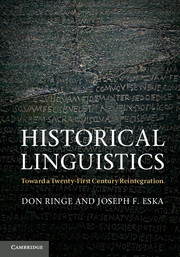Book contents
- Frontmatter
- Contents
- Figures
- Tables
- Preface
- Acknowledgments
- Introduction
- 1 The nature of human language and language variation
- 2 Language replication and language change
- 3 Language change in the speech community
- 4 Language contact as a source of change
- 5 Sound change
- 6 The evolution of phonological rules
- 7 Morphology
- 8 Morphological change
- 9 Syntactic change
- 10 Reconstruction
- 11 Beyond comparative reconstruction
- Appendix: Recovering the pronunciation of dead languages: types of evidence
- References
- General index
- Index of languages and families
Introduction
Published online by Cambridge University Press: 05 February 2013
- Frontmatter
- Contents
- Figures
- Tables
- Preface
- Acknowledgments
- Introduction
- 1 The nature of human language and language variation
- 2 Language replication and language change
- 3 Language change in the speech community
- 4 Language contact as a source of change
- 5 Sound change
- 6 The evolution of phonological rules
- 7 Morphology
- 8 Morphological change
- 9 Syntactic change
- 10 Reconstruction
- 11 Beyond comparative reconstruction
- Appendix: Recovering the pronunciation of dead languages: types of evidence
- References
- General index
- Index of languages and families
Summary
Special challenges of historical linguistics
“Historical linguistics” is the study of language change and its consequences. Simply because it is the study of change, it involves a number of difficulties with which other linguists do not have to cope, at least not to the same degree. We outline the chief difficulties here not merely to warn the incautious student about what (s)he is getting into, but also and especially to say how historical linguists deal with them and how their strategies for doing so define and shape the field.
Most obviously, we can describe a change from state A to state B only after we have described the beginning and ending states adequately; thus any historical linguist has to have at least a fair acquaintance with language structure and how to analyze it. In this book we have presupposed an elementary knowledge of phonetics, of the principle of phonemic contrast, and of generative phonology and syntax because we cannot even discuss sound change, phonological change, and syntactic change without using the basic concepts of synchronic linguistics. We assume throughout that some version of the generative paradigm is the standard model of linguistic description because that reflects our professional experience.
- Type
- Chapter
- Information
- Historical LinguisticsToward a Twenty-First Century Reintegration, pp. 1 - 6Publisher: Cambridge University PressPrint publication year: 2013



